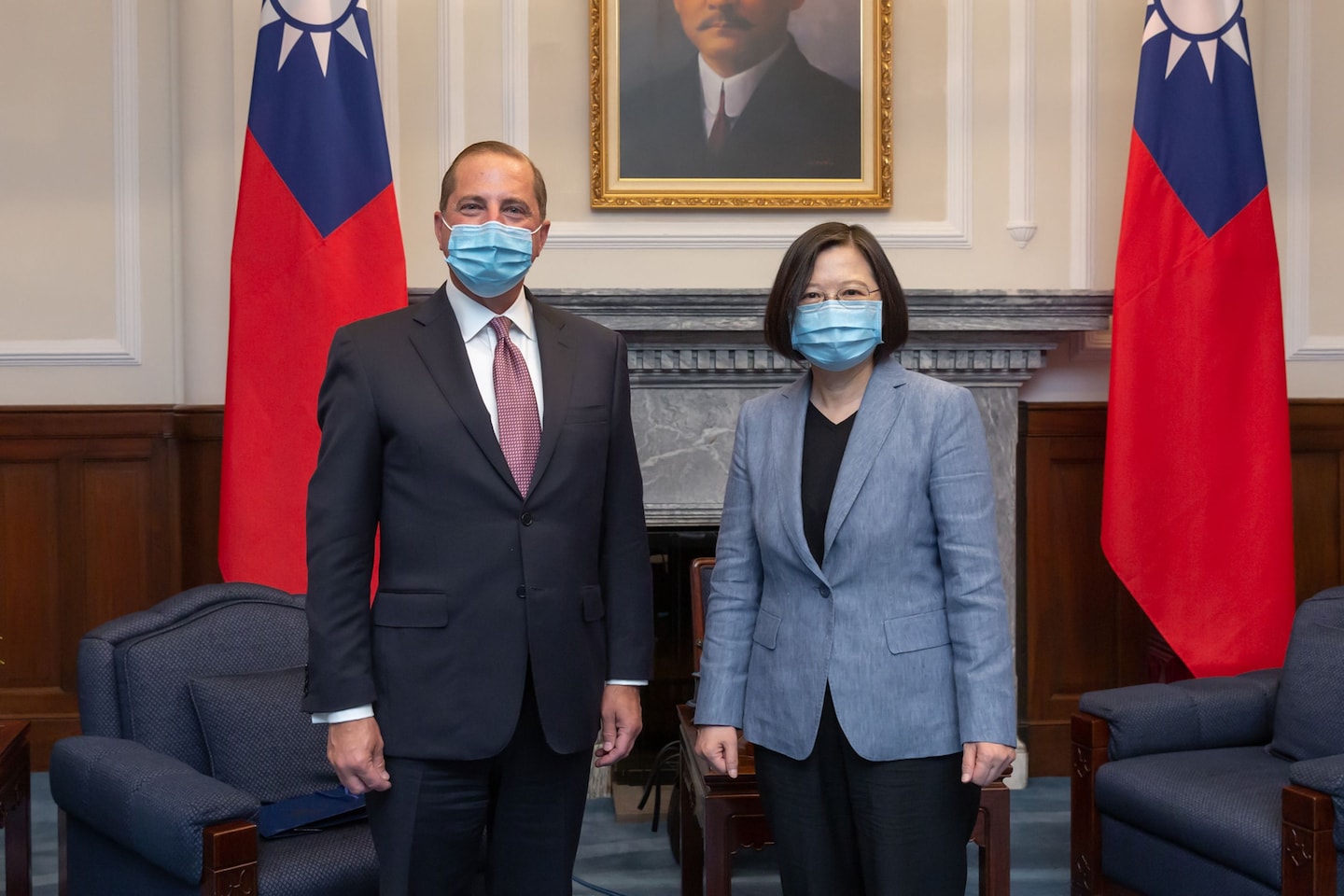U.S. praises Taiwan’s coronavirus strategy in highest-level visit since 1979

Azar’s three-day visit was prompted, he said, by Taiwan’s “world-class” response to the coronavirus: The island of 23 million has reported fewer than 480 cases, and U.S. and Taiwanese officials signed an accord Monday pledging further cooperation on disease control and drug development.
But the trip, in optics and rhetoric, was framed squarely against the backdrop of the escalating conflict between the Trump administration and the Chinese government, which dispatched fighter jets into the Taiwan Strait on Monday to show its displeasure with the U.S. visit.
China claims Taiwan, a self-ruled island backed militarily by Washington, as its territory and it objects strenuously to Taiwan’s participation in international bodies like the World Health Organization and to any official exchanges that lend Taiwan the appearance of sovereign nation status. Under a framework that recognizes Beijing as the sole government of China and acknowledges — without accepting — China’s territorial claim over Taiwan, senior U.S. officials rarely meet with the Taiwanese president.
But norms of behavior have been shifting under the administrations of President Trump and Taiwanese President Tsai Ing-wen, who is frequently criticized by her domestic opponents for siding too closely with Washington and jeopardizing Taiwan’s economy and security.
Echoing strident criticism of China by other administration officials and Trump himself, Azar told reporters in Taipei that Taiwanese officials were better prepared for the pandemic precisely because they had been “scarred” by China’s lack of transparency during the severe acute respiratory syndrome outbreak that began in southern China in 2003.
He also faulted the WHO for denying Taiwan a role as an observer of its regular assembly at China’s behest. Trump recently ordered the U.S. withdrawal from the WHO, which he claimed was beholden to the Chinese government.
“The Chinese Communist Party and the WHO have resisted” U.S. appeals to include Taiwan at the World Health Assembly, Azar said. “This is one of the major frustrations that the Trump administration has had with the WHO and its inability to reform.”
Azar and the U.S. envoy to Taiwan, Brent Christensen, at times called Taiwan “a force for good,” echoing the ideologically tinged rhetoric of U.S. officials who have increasingly sought to highlight a cleavage between democratic countries aligned with Washington and those with Beijing.
Tsai responded in kind as she thanked Azar, along with Trump and Secretary of State Mike Pompeo, for supporting Taiwan.
“Your visit testifies to the fact that over the past 40 years or so Taiwan-U.S. relations have never been better, and represents a big step forward in our bilateral cooperation to prevent pandemics,” Tsai told Azar at their meeting. “Together, we can contribute to peace, stability and development in the Indo-Pacific.”
Tsai also said in a tweet that Taiwan and the United States could prove that “democracy is the best system to overcome global challenges,” in a rebuke to the Communist Party that rules China.
Chinese Foreign Ministry spokesman Zhao Lijian told reporters in Beijing on Monday that Taiwan was “the most important and most sensitive issue in U.S.-China relations” and warned Washington against elevating relations with Taipei.
Azar, in his remarks Monday, said his visit remained consistent with the “one China” principle and largely refrained from commenting on diplomatic relations.
Zhu Zhiqun, an expert on Chinese diplomacy at Bucknell University, said the Trump administration is not expected to significantly change its policy toward Taiwan despite calls from some China hawks in Washington to formalize relations with the island.
“Azar has focused on health issues, and if he limits his comments to that area, that shouldn’t be seen as a strong provocation against Beijing,” Zhu said. “But if he goes forward and talks about how Taiwan should be recognized, that’s different. Beijing has so far showed restraint.”
Taiwan’s military said that Chinese fighters briefly entered its airspace around 9 a.m. Monday — shortly before Azar was due to meet with Tsai. The incursion was rare and marked only the third time Chinese fighters have crossed the median of the highly sensitive Taiwan Strait since 2016, according to Reuters.
During a discussion with Taiwanese health authorities, the Taiwanese side shared details with Azar about the scale of its testing efforts and border controls that have helped keep case numbers down, Taiwanese officials said.
Azar and other administration officials have been widely criticized for failing to provide adequate testing in the United States, which crossed the 5 million-case threshold this weekend, the most in the world.






